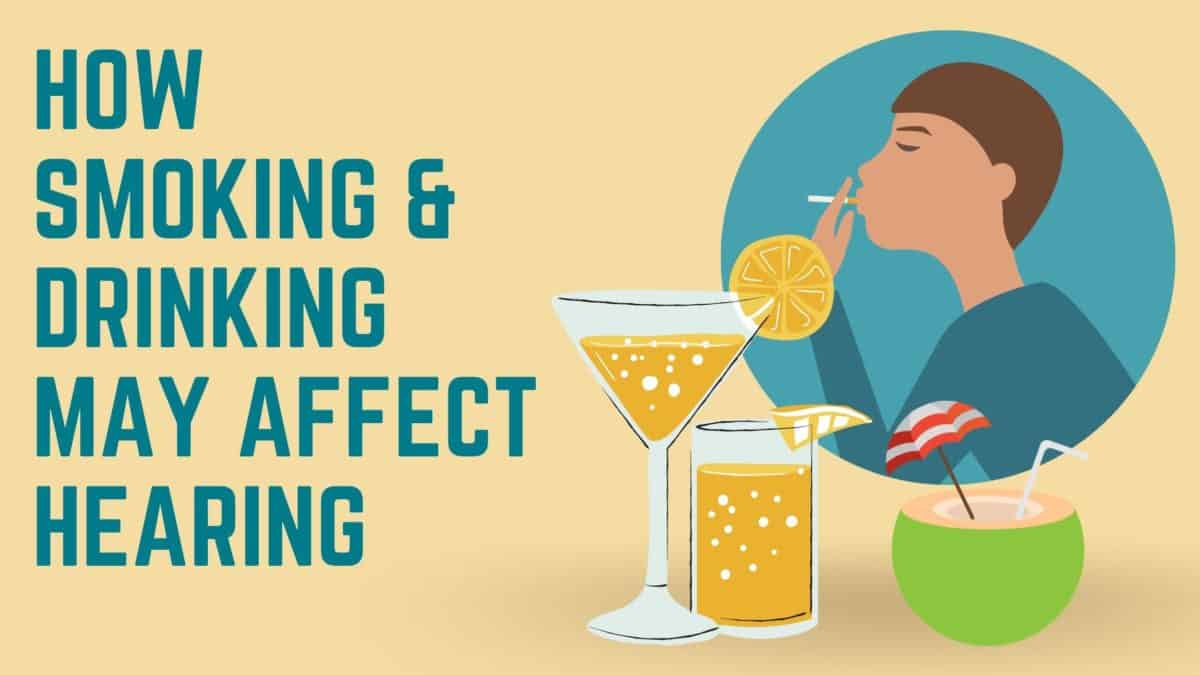We’re all aware that smoking and drinking qualify as “risky behavior.” While smoking is never a good idea, alcohol does seem to have some benefits to our physical health when used in moderation. Have you ever wondered whether smoking and drinking have an impact on your hearing ability? Some new research is helping us to clue in to just what these classic vices are doing to our ears.
Smoking and Hearing Loss
There is a typical result when studies are done on the effects that smoking tobacco has on physical health: it’s bad! Not only that, but the severity of the problem tends to increase with the frequency of the smoking habit.
Hearing loss turns out to be no different. The more you smoke, the more likely you are to be doing damage to your hearing.
In a British study from 2014, researchers also discovered that simply living with a smoker increases your risk of hearing loss. Even passive exposure to cigarette smoke—sometimes called “secondhand smoke”—increases the likelihood of hearing loss.
The authors of the study, called “Cigarette Smoking, Passive Smoking, Alcohol Consumption, and Hearing Loss,” were suspicious that age-related hearing loss may not be as “normal” as we think. While we expect that about half of people age 65 and up will have hearing loss, it seems that younger generations of people have not been experiencing as much hearing loss as we expect based on previous generations.
It may be that what we call “age-related hearing loss,” or “presbycusis,” is actually caused by other factors that build up over time, eventing in hearing loss after a certain age.
In the case of smoking, it appears that avoiding tobacco smoke can help prevent, delay, or lessen the impact of hearing loss occurring around retirement age.
The researchers indicated that there may be two reasons smoking harms the ears. First, they hypothesize that nicotine and other chemicals in cigarette smoke may be ototoxic—meaning that these chemicals essentially poison and kill the delicate structures of the inner ear.
The other possibility they noted has to do with the vascular effects that smoking produces. Smoking tends to thicken the blood and reduce its oxygen content. This may starve the inner ear of oxygen, a condition called “cochlear hypoxia.”
A Japanese study found that smoking had a striking effect on factory workers. A group of workers who all worked on the same machines were presumed to be exposed to unsafe noise levels from the machines. While all the workers experienced some hearing loss, those who smoked had more hearing loss, suggesting that smoking may also increase the damage from noise. This makes sense when considering the effects of cochlear hypoxia, which would make the sensitive hair-like cells inside—stereocilia—less resilient in the face of damaging noise levels.
While there is much speculation that can be done regarding how smoking causes hearing loss, one thing is clear: Avoiding cigarette smoke will have majorly positive effects on your hearing health!
Drinking and Hearing Loss
Alcohol has been noted to have a positive effect on cardiovascular health. When this was discovered some twenty years ago, the alcohol industry ran wild with it, advertising that drinking booze can save your life. Compared to teetotallers, those who drink in moderation—one or two drinks per day—actually do have better cardiovascular health. However, those who drink more heavily have worse cardiovascular health than teetotallers.
In the British study from 2014, researchers note these cardiovascular effects in order to suggest that the cardiovascular system may be implicated more directly in hearing health. Much in the way that smoking’s effects on the blood may be the cause of hearing loss, the same could hold true for alcohol.
In fact, the results of the study on hearing loss were similar to the results for cardiovascular health. Those who drank in moderation had less hearing loss than teetotallers. Those who drank heavily had about the same or slightly more hearing loss than teetotallers.
It seems as though the ears may be something like the “canary in the coalmine” of our bodies. Hearing loss that progresses faster than normal can indicate an underlying cardiovascular condition, and it seems that the same measures we would take to protect our cardiovascular system also have positive outcomes for our hearing ability.
What’s the Takeaway?
If you smoke, stop! Avoid secondhand smoke. Have a maximum of two drinks per day, and if you find yourself drinking more than that, it’s best to stop. Your ears will thank you!


